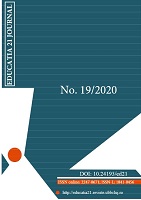Movies in Education: A Non-Formal Approach for Lifelong and Lifewide Learning
Movies in Education: A Non-Formal Approach for Lifelong and Lifewide Learning
Author(s): Fabio BocciSubject(s): Education, Film / Cinema / Cinematography, Pedagogy
Published by: Universitatea Babeş-Bolyai
Keywords: cinema; lifelong learning; cinematic experience;
Summary/Abstract: The cinematic language, in addition to acting as a persuasive mediator to be used in training contexts, can represent a meeting point between non-formal and formal education in the different lifelong-lifewide learning contexts. In this paper, the author specifies what we usually define as cinematic experience starting from the correlation between physical space (I’m going to the cinema) and visual act (I’m going to see a film). Then, he describes the components of the cinematic language (for example: long/full shot, plan américain/medium long shot, medium shot, medium close-up, close-up and extreme close-up, extreme wide, long/wide, etc.). Moreover, the author presents the psycho-pedagogical characteristics that are activated while participating in the viewing of a film. Finally, describes two examples of non-formal education through cinematic language. The first one refers to the Visualfest, a contest organized by the Department of Education of Roma Tre University, that aims to promote the dissemination of works created by scholars, teachers, students, educators and professionals who use images as a vector of knowledge. The second one is Co-Educa, an initiative of co-education, of alliance between the scholastic-editorial-cultural-scientific fields for the construction of a network of active subjects and the establishment of an authentic pedagogical agora.
Journal: Educatia 21
- Issue Year: 2020
- Issue No: 19
- Page Range: 4-10
- Page Count: 7
- Language: English

